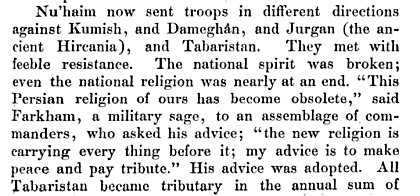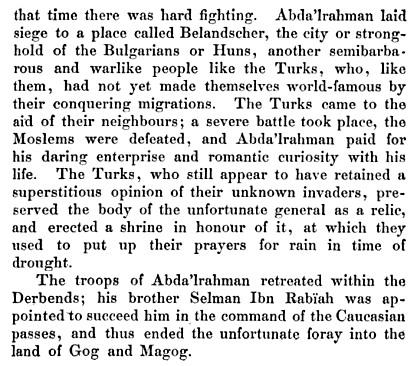tábor : cseh vagy török eredetű? (vagy egyik se)
https://www.researchgate.net/publication/270536560_The_Turkic_and_Eastern_European_background_of_the_etymology_of_Hung_tabor_military_camp
1383 thabor [tābor] ‘army, troop’, 1519 ‘camp’ | tābor 7 < *tabur
← Middle Turkic tabur ‘army, military camp’ < *tabgur < 8 *tabkur ← Mongolic dabkur | Middle Turkic tapkur, tabur ‘(military) 9 camp’
a csehek cseh eredete mellett érveltek...
de
Armeno-Kipchak
13 1957: tabor ‘camp (retranché derrière les voitures) | Wagenburg’ (Deny 1957, p. 72)
14 1968: tabor ‘camp, encampment’ (Schütz 1968, p. 145)
15 1972: tabor ‘camp retranché’ (Tryjarski 1972, p. 727)
16 (b) Chagatai
17 1862: dapqur ‘hadrend, sor [= battler order, battle line]’ (Vámbéry 1862, p. 60)
18 1869: tapqur ‘отрядъ войска, посылаемый для рекогносцировки или грабежа’
19 (Budagov 1869, vol. 1, p. 719)
20 1869: dapqur ‘saf ve alay’ (Vel’jaminov-Zernov 1869, p. 254)
21 1876: tabor ~ tabur ‘verschanztes Feldlager, Wagenburg’ (Zenker 1876, vol. 1, p.
22 595)
23 1870: tapqur ‘troupe; détachement; imposition extraordinaire’ ~ dapqur ‘botte;
24 bouquet; troupe, rangée de troupes’ (Pavet de Courteille 1870, pp. 192, 314)
25 1881: tabqur ‘arabalar birbirine zincirle kuşadılup kale şekline girmiş istihkam’
26 (Šejχ Sülejmān 1881, p. 97, after TLH and Kúnos 1902)
27 1902: dapqur ‘deste, bölük | Truppe, Heer’ ~ tabqur ‘arabalar birbirine zincirle kuşa
28 dılup kale şekline girmiş istihkam; tabur | eine aus zusammengebundenen Wa
29 gen errichtete Wagenburg; Lager’ (Kúnos 1902, pp. 56, 182)
30 1905: tapqur ‘zur Recognoscirung oder zum Rauben ausgeschickte Truppenabtei
31 lung’ (Radloff 1905, vol. 3/1, p. 953)
32 1960: tapkur ~ tabur ‘camp, encampment’ (Clauson 1960, pp. 49, 64, 87)
33 1970: dapqur ‘saf ve alay, tabur’ (Atalay 1970, after TLH)
34 (c) Ottoman Turkish
35 1971: tabur ‘istihkâm; ordugâh’ (TarS 1971, vol. 5, p. 3696)
+
3.3. Remarks on the above Armeno-Kipchak Data
2 In Armeno-Kipchak only the form tabor is attested always with an -o- in the second 3 syllable which is, in general, quite unusual for Turkic native words. Its oldest attesta4 tion goes back to the 17th century, i.e. the period when Armeno-Kipchak was under 5 very strong Polish and Ukrainian influence (for a detailed overview of Polish lexical 6 influences on Armeno-Kipchak, see Stachowski 2010). The most probable and most 7 obvious explanation would be, then, that Arm.-Kipch. tabor is a Polish (or less proba8 bly Ukrainian) loanword, and therefore cannot represent the Middle-Turkic lexical 9 stock, cf. OPol. (1424) tabor ‘castra curribus cincta’ (SStp 1982–1987, vol. 9, p. 80) 10 and OUkr. тáбір ~ тáбор ESUM (2006, vol. 5, pp. 499–500)
7. Conclusions
29 According to the view expressed in this article the word tabur cannot be explained as
30 a variant of tapkur for phonetic, morphological and semantic reasons.
31 As far as the Turkic languages are concerned, tabur in the sense ‘military
32 camp’ appears only in Ottoman (from the 17th century on), and seems to be of Polish
33 or Hungarian origin. In the meaning ‘camp; gipsy camp’ it is found in Tatar, Bashkir,
34 Kirghiz, Nogai, Kumyk and Turkmen and is of Russian origin there. The meanings
35 ‘1. cattle camp; watering place for cattle; 2. watering time; 3. herd of horses’ show up
36 only in Tatar and Chuvash, i.e. only in the Volga region, and seems to result from a
37 specific semantic development (which is visible in Russian dialects, too). In other words, tabur has no significant Turkic background.22
csakhogy ez nem veszi figyelembe a
magy. toboroz igét
és Taboristan nevét (amelyik nem arab eredetű és létezett már a 7.században is)


a toboroz kapcsán az etimologiai szótár nem okoz meglepetést
toboroz [1553 u.] Származékszó egy önálló alakban nem adatolt tobor- alapszóból. Az alapszó maga is származékszó,
mely -r gyakorító képzővel keletkezett a tipor, toporog igék alapjául is szolgáló nyelvjárási top ’lenyom, lép’ igéből. A
toboroz szóvégi -z hangja gyakorító igeképző, a szó belseji b zöngésülés eredménye, vö. tobzódik, tombol. Eredeti jelentése
az alapigének megfelelően ’táncol’ [1553 u.] volt, a később használatos ’verbuvál’ értelme [1816] nyelvújítás kori, és az
alakilag hasonló táboroz ige hatását tükrözi.